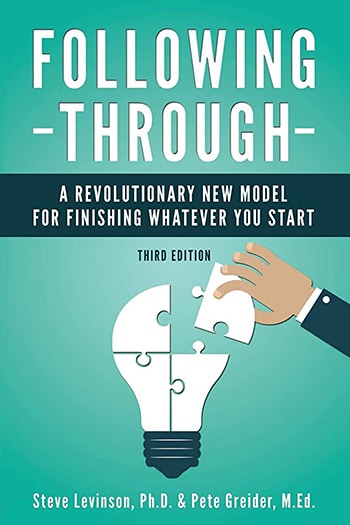You get really excited about an idea to start an exercise program, or become a better partner, or get organized. And then you do . . . nothing. Absolutely nothing. It's said that the road to Hell is paved with good intentions. Even if they don't send you straight to Hades, good intentions, that go unfulfilled, can lead to real suffering. When you fail to act on your perennial plans for progress, you end up feeling frustrated, demoralized, and stuck. My guest is a clinical psychologist who has spent his career obsessed with how to tackle this stubborn issue of human existence. His name is Steve Levinson, and he's the co-author of Following Through: A Revolutionary New Model for Finishing Whatever You Start. Steve first explains the unhelpful ideas we have about why we don't follow through and that its real cause comes down to a tension between two different systems within us. He then shares the ah-ha moment he had as to how to reconcile these systems in order to consistently follow through on your intentions and offers strategies on how to put his follow-through method into practice. We end our conversation with the idea that the greatest strategy for increasing your follow-through is treating your intentions with a seriousness that borders on the sacred.
You get really excited about an idea to start an exercise program, or become a better partner, or get organized. And then you do . . . nothing. Absolutely nothing.
It's said that the road to Hell is paved with good intentions. Even if they don't send you straight to Hades, good intentions, that go unfulfilled, can lead to real suffering. When you fail to act on your perennial plans for progress, you end up feeling frustrated, demoralized, and stuck.
My guest is a clinical psychologist who has spent his career obsessed with how to tackle this stubborn issue of human existence. His name is Steve Levinson, and he's the co-author of Following Through: A Revolutionary New Model for Finishing Whatever You Start. Steve first explains the unhelpful ideas we have about why we don't follow through and that its real cause comes down to a tension between two different systems within us. He then shares the ah-ha moment he had as to how to reconcile these systems in order to consistently follow through on your intentions and offers strategies on how to put his follow-through method into practice. We end our conversation with the idea that the greatest strategy for increasing your follow-through is treating your intentions with a seriousness that borders on the sacred.
